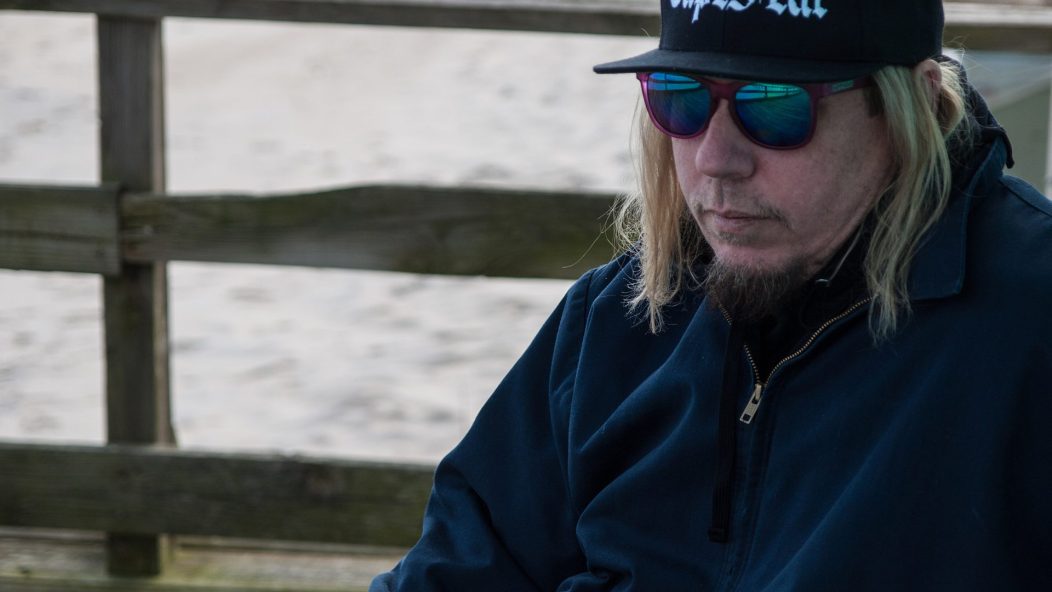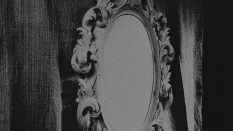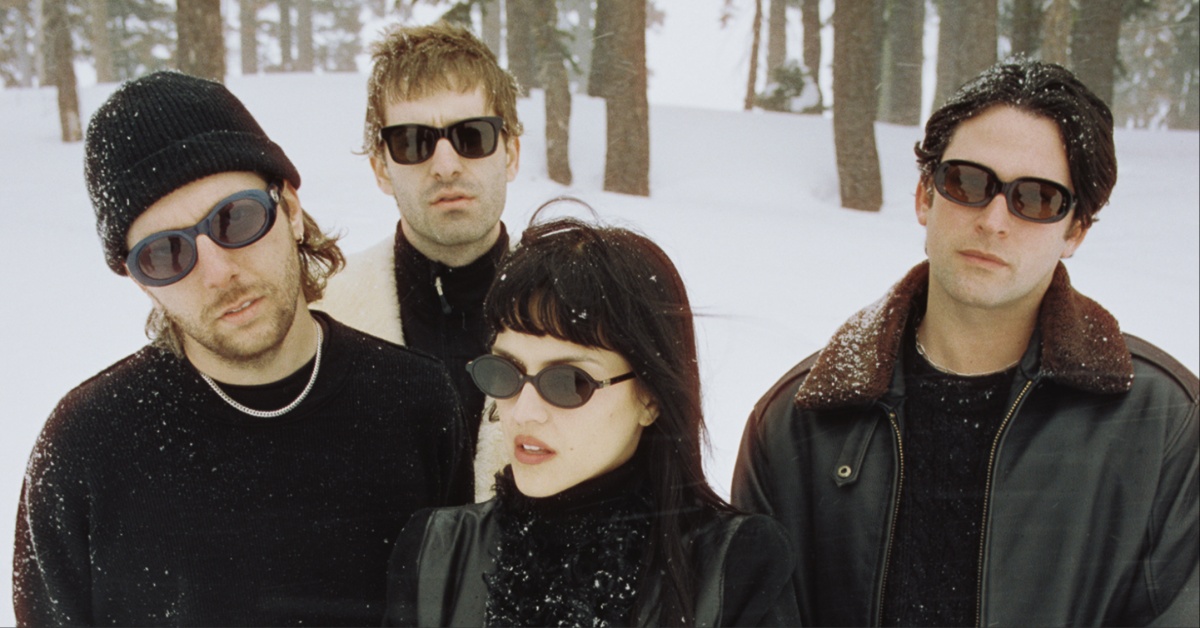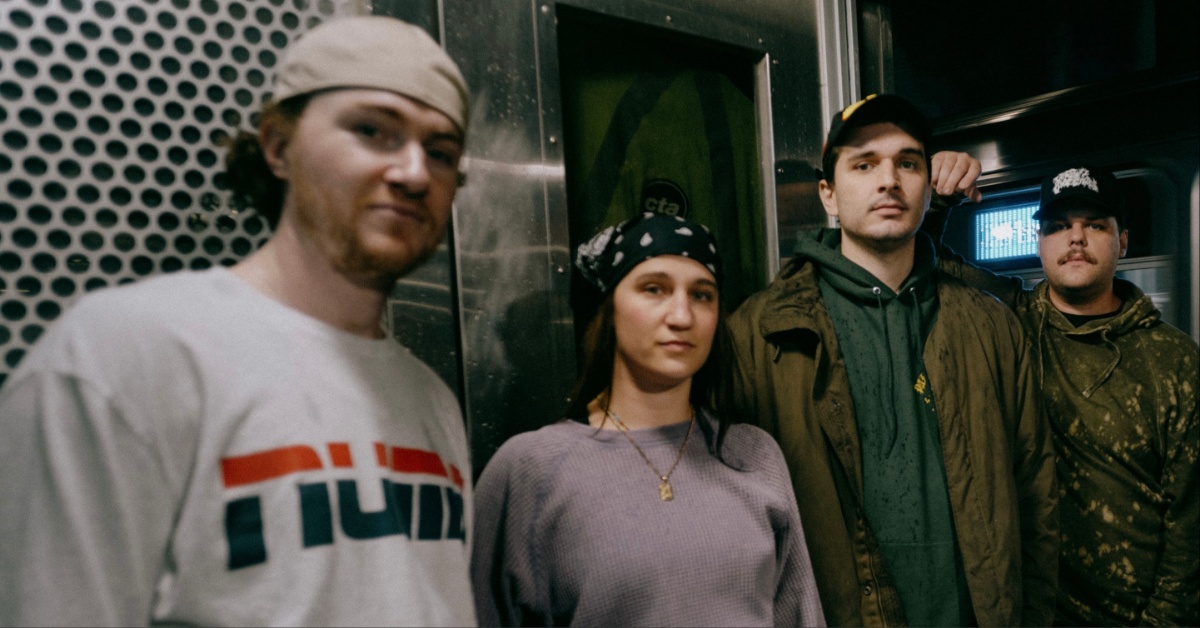
Interview: Troy "T-Roy" Medlin (Sourvein)

…
If you know Southern Metal, you know Sourvein. For more than two decades Sourvein has provided some of the thickest, swampiest, heaviest riffs to grace the Slow Southern Steel, and despite a revolving door of band members they remain energetic and prolific to the present day. Their latest effort, Aquatic Occult, is a continuation of their musical sound, but is an interesting departure from previous records and indeed the Southern Metal genre in general in its focus on fantastic themes in place of harsh reality. With this at the forefront of my mind, and as a longtime Sourvein fan, I spoke to the band’s sole constant member and mastermind (and all-around chill dude) T-Roy Medlin about fantasy islands, writing processes, Southern metal in non-Southern places, and the Dirty South.
…
…
Let’s talk about the new album. This one’s called Aquatic Occult and it seems to have this whole sort of aquatic/nautical theme to it. I’m curious where this theme originates and why the lyrical shift from past albums.
Right on. Well, it’s getting back to my roots. I was born and raised on the islands off the coast of North Carolina. It’s the first fantasy or loosely themed record we’ve ever done. I used to address thoughts and vent anger through songs, though not all of them. Our last record had a vampire song, but this one had a loose umbrella of being aquatic and nautical, about the sea and these abandoned islands and sea creatures. I’ve had the idea for a while. It’s kind of like a “fantasy island” type thing.
Sourvein hails originally from the Wilmington/Cape Fear area. How much is Sourvein a “coastal” band? Do you feel that the Cape Fear area serves an artistic purpose?
We’re based out of Carolina Beach, which is in Cape Fear, a town over from Wilmington. I had neighbors that were from across the river, and we were one of the first bands to be like “we’re from the Cape Fear area.” I never did live in Wilmington. I lived there for a few years in the beginning. When I turned 21 I lived downtown for a while and that’s where a lot of the struggles were, like working at a car wash and trying to tour. But then I had to move around, to play more shows and to get more exposure, because there weren’t any tours coming through my town. So we’re still very tied to the area. I still spend a lot of time on the islands, and I travel a lot for work so I’m back-and-forth. My family’s still in the islands, and I’ve worked in New Orleans and I’ve worked in Venice Beach, but I always come back. So it’s home.
But in many ways, being from Cape Fear, the struggle that comes through in the music is the struggle to get out, you know? Get everything rollin’ and get out. It’s an island and it’s easy to get caught up in the vacation vibe. It’s easy to get unloaded and it’s a struggle to stay focused and not just join in the party over and over again. It’s crazy, because a lot of people are like “being stuck on a beach sounds great,” but we’re trying to tour the world.
And even if you’re in a band and trying to move forward, it can be tempting to just spin your wheels, as I’ve often found in my experience.
Right. Ever since I was young and in a band, I was like, “this is what I wanna do.” Once I decided that was what I wanted to do, I knew that I wouldn’t be able to stay on the beach and around my family. I had to at least move to downtown Wilmington, and at least move from there to a bigger town like Raleigh or something, and then New York City or New Orleans or California, who knows? It had to go out. But still, [the islands are] where I’m from.
Going back to the new record, Sourvein is a long running act which has gone through a lot of lineup changes. In many ways, you are the band. Nowadays, what is the songwriting process like? When you wrote Aquatic Occult, what parts of it did you write? Obviously the vocals and lyrics, but what of it is your vision and and what of it is other members and, when Sourvein is practicing now, how do you craft a song?
The song comes about from the riffs. I collaborated with a few people on this one and I had a bunch of riffs of my own that I knew the pattern to. I make sure that I have my batch of riffs, and that way I’m already working on a lyrical idea or a melody, seeing where those might fit into a song. Other people may contribute, but because I have to sing on it, I may arrange what goes on there as well. And then the lyrics fall into place, then we add and subtract music, so it all goes through a process. I brought a lot of riffs on this record, and Stig from Amebix brought in the intro and outro. Reed Mullin [from Corrosion of Conformity] did some playing on drums, so he’s gonna write his own parts and bring in another dimension with that.
…

…
You mentioned how your biggest original influences were punk rock, and on this new one, as you said, Stig from Amebix is on board. I was curious about that, because I love both Amebix and Sourvein but it seems like in many ways they’re quite different. How did that collaboration evolve?
I’m a big Amebix fan from back in the day. I think I was in high school when a friend turned me on to Arise! and I got very into it. Not many people knew about them at the time. So I was a fan, and Stig was my favorite guitarist as well. It’s one of a few main elements, like Saint Vitus or Corrosion of Conformity. That was kind of how Amebix was, and it kind of seeped into the [Sourvein] sound. We just got together and started talking about doing something. We didn’t know where or when, it was just like, “Hey man, it would be cool if you could do, like, an intro or a lead on something,” and he was like, “Yeah man.” I was given the opportunity to do this record, I wanted a few guests, and Stig was the first guy I called. It was a complete honor to meet him and really cool to have him involved.
And from listening to Amebix and also listening to past collaborations which Stig has done, like with Panopticon, he seems like the kind of guy who is totally willing to contribute some really interesting things, so I appreciate that this was able to happen.
I just thought it would be really cool to have one of my favorite guitar players do some stuff in the Sourvein vibe. He listened to our albums and he was like, “This is what I think I could do with your sound.” It was very cool to work with him, he was on point, and it was a total honor. And, you know, Dean Berry from Iron Monkey does the lead on one song. He’s an old pal too; I used to trade tapes with the Iron Monkey guys back in the early ’90s. And then a few years later he was in Capricorns, and we became pals. I was like, “We wanna have someone else now? Get Dean involved on a song!” So I got in touch with him and he gave a lead. We had some time and we had some friends and we got to invite them all to do songs.
It’s good to have that circle of collaborators.
On this one, like we were talking about earlier, it’s my first album that’s not totally serious or “deadly.” This is a fantasy. Like, “Let’s have fun and invite a few people over. Oh he wants in too? Well alright!” I mean, we did four interludes, we had guests and we’d just do these little two-minute interludes. It was the opportunity to invite some people to this “fantasy island” recording. A few people from my hometown, guys like Stig and Dean, having Reed on there, the Subrig Destroyer guys from Athens joining in on some tunes. It was just cool to be able to have the opportunity to do that with everyone. It was a different kind of album, so I opened the door a little bit.
We’re talking about themes, so with regard to lyrics, how do you go about actually thinking up lyrics and committing them to paper?
Well man, for me that’s where it starts. I’m a person who writes a lot anyway. It’s funny that you say that, because I was just putting some stuff in storage and going through a few suitcases, and I got like 45 notebooks that date back over 25 years.
Wow.
And I’m looking back and I also got three that I’m working on right now. Like, I’m still doing it, and this notebook’s from ’92! As I started playing in a band and skateboarding and surfing and all that, I was into poetry and writing songs and early Run DMC rap kinda stuff. Just words and wordplay, you know? So that’s never been a problem for me. For some people it’s a task where they gotta put a lot of effort towards it, but I write a lot of stuff anyway. A lot of times I write abstract lyrics and weird metaphors. Like our song “Fang” from our last album is loosely based on Theda Bara, who was a silent film actress, so I was basically talking for her. It’s all kind of broken poetry, you know? It’s verse that I’ve put wordplay to and tacked together, to tell a little tale.
And there’s poetry in just putting words together and letting their flow be the art. It doesn’t have to mean anything.
There’s a lot of times where I’ll have a word written out and I’ll be in the booth singing and I’ll be like, “Don’t be so serious about it. This sounds better.” If you’re writing and it’s not correct English . . .
It doesn’t matter.
Right. Two words sound good together, which makes them yours. Better to be original, you know? I’m always writing, and with this one I would just think of something like “shipwreck,” and then I would just start dropping little lines here and there about treasure, or something floating away, something sinking, something that washed ashore. Then I would write about real things that went on top of the topic of shipwrecks. How can I fit in a metaphor for addiction with tentacles, put it into a kind of nautical warning?
It’s an interesting way to take the abstract and connect it to more real world themes, which Sourvein has touched on in the past.
Right. But then there’s another song [on the new record] that’s just totally wordplay and about different seabirds. So it’s a trip and it was more of an open door kind of thing that didn’t have to be about struggle, sacrifice or day to day life. There was some of that on other records, too, but it was time to do a different kind of thing. It’s lighthearted, it’s positive, it’s fun. I’m always writing lyrics man, and all I have to do is go back and pick ’em out.
And considering it’s been over 20 years of Sourvein, you’ve got a massive wealth of potential lyrics to choose from.
Half the time I end up not even going to the old stuff; I just keep writing new ones, or end up using things from what I read. Like today I was looking through this old stuff, and I was like, “I gotta go back and rewrite some of the things that are cool in this book.” My new notebook is sitting on the table as I’m going through this old notebook. One day I’ll probably go through it all and pick out my favorite stuff and try to piece it together into a lyric book. I might even do it punk rock style and just do it myself or something, just to release it at all.
We’ve talked about lyrics, now let’s talk vocals. When you do vocals, do you ever feel like there’s a design to them, or do you just go in and instinctively know what you’re doing? With a lot of bands you get guys who craft their vocal styles, but with a lot of bands it’s just dudes who’re just belting it out. Where does your distinctive style come from?
Mine comes straight from the heart, just pure passion. I came up just straight singin’ it out, straight from the heart, trying to be heard over shitty PAs, singing through guitar amps [laughs]. My voice has kind of evolved from club to club, year to year, tour to tour, and I still approach it just the same. In the studio, if [someone is] like, “Hey try this,” then yeah, but doing the albums over the past few years I just straight up did it. My style has just evolved over the years from the same style I’ve always had. When I started, I didn’t know what I was doing, I was just screaming my heart out trying to be like H.R. or Keith Morris.
Going back to the whole punk influence. Three chords and just beltin’ it.
I wanted to be like those guys, and also like Bon Scott and ’70s rock shit. Those were the influences that I knew, and there wasn’t a place to practice [vocals] unless the sound guys cranked you up, so you had to practice it one club at a time. Started at people’s parties, then went to bigger and bigger and bigger clubs. It all just evolved. I just use what comes from the heart, both with lyrics and vocals.
Which in turn makes it distinctive, because it comes from you.
I’ve never sang anyone else’s lyrics except for when I was a guest on Hank III’s record, because I gotta believe it. Because I gotta make other people believe it. It’s gotta be real to me. Even with this new record where, like we said, it’s fantasy, I believe it because I wrote it. I created a fantasy world, an escape, and it’s the same thing as, “Check this out, man, it’s real.” It’s the same thing, like, “Check out this fantasy.” But I have to believe it first.
…
…
Moving to something only sort of related, nowadays what is your professional and musical life like? How much of your time is devoted to touring, how much is devoted to recording, how much is devoted to writing, and how much of that is other passions? Having done this for 20 years or so, how do you allocate your energies?
Well, right now we’re 23 years into Sourvein, and for the first 19 years of the band we stayed busy on the road, pretty much four to six months of touring at least. This was pretty much every year since 1994, so until last year. We’ve done some shows since last year, but we didn’t tour, because we had to write the record, record the record. All that sets you back financially because you gotta be out of town, playing gigs that you sometimes don’t get paid for, it’s all very hard, you know? So when you come back from being out of town for two months, you’re really set back. When I do a record, and it’s going to get me on the road and I’m going to go into debt, I go into writing mode so I’ve got some stuff ready for the next cycle. Or while I’ve got the time, I’m always coming up with last minute ideas and songs, I’ll be practicing a certain riff and I’ll come up with new material until it’s too late. When we get into the cycle for this latest tour, we’ll do Europe, we’ll do the West Coast, and we’ll do it in two sections. I usually do a “hardcore summer” at home working, and a “hardcore winter.” I don’t tour in the winter anymore.
That’s hibernation time.
Yeah, we’ve toured Colorado and then all up and down the West Coast and up through the Northeast in winter one too many times. I’m not into loading out into snowy, blizzard weather! So we’ll hit it in the spring and the fall, and if you get a good opportunity in winter then yeah, but otherwise no. But I split my time up like anyone, man, and I can’t do it fulltime and have stuff at home too. Say it was my fulltime job, I still have stuff to take care of, like family, that calls my attention. It’s not like, “You wanna go on tour for a full year? Let’s go!” Ten years ago I could have said “Yeah,” now I have responsibilities as a family man. I do the best I can, and I make sure to hit everything in a few parts in a year.
Absolutely. So here’s a question which is a little more abstract. I always associate Sourvein with the Southern Sludge sound, like Eyehategod, Down, Corrosion of Conformity, that whole scene. It’s a regional sound and it’s very distinctive. But nowadays, and this is neither inherently good or bad, but you see bands like Dopethrone from Canada or Belzebong from Poland who do that same style but grew up with you guys as their main influence. The internet has disseminated the regional sound. Do you view that as an homage, or do you think it misses what makes Sourvein and other Southern bands original?
I’m honored by it. I don’t hold it against anybody, if that’s what they wanna sound like. I mean, I was just talking about my influences and how I applied them to my nature, to myself. But if someone’s influenced by us, I think that’s cool. And if the internet does make it more available, I just think it’s cool to keep it going. If a band is inspired by our sound and all of a sudden they have a demo tape and then all of a sudden they have a record, that’s awesome. I don’t think that if they’re from Poland or whatever that they’re necessarily trying to act like they’re Southern. I don’t think it matters where you’re from. If that’s how you wanna sound and who you’re inspired by, that’s cool by me.
That’s a good outlook to have on it, I think.
I mean, we joined into that sound too after starting out, and we had similar influences to Eyehategod and two or three other bands here and there. We definitely all liked late-era Black Flag, Melvins, Saint Vitus, Amebix, Flipper, stuff like that. There wasn’t that many people doing it. There’s more and more bands now, and they keep going in that vibe and attitude.
Randy Blythe from Lamb of God recently wrote a biography of Sourvein and interviewed you. What was it like working with him and how did that get set up? Obviously, you’ve been in the scene for a while and you know a lot of major figures in it. Did you know Randy already or was that serendipitous? What were his writing and interview styles like?
Randy’s a dear old friend. I’ve known him a while. We go back to skateboarding and him visiting the beaches around here when he lived in Richmond, so he knows the area. He doesn’t do the typical metal bio, like, “IT’S HEAVY AND BRUTAL AND IT’S GONNA CRUSH YOU!”
The typical buzzwords.
Yeah, like, “the band has made the sacrifice” and blah blah blah. His style is more like a personal tale. I like that style. With ours, he knew the story behind Aquatic Occult before anybody had heard about it, back in 2010. I was actually going to do this record back then, with the fantasy thing. But then the vibe changed, due to things I was going through: my buddy’s passing and having some bad luck which I had to fight my way through. Black Fangs was actually supposed to be Aquatic Occult.
Really?
The timing wasn’t right. We couldn’t go to “fantasy island,” you know? I had to do a more personal, negative, coming-from-a-dark-place record. And at the same time my life was changing. I stopped drinking, stopping hanging and partying and got more focused on my life and music. And that was where [Black Fangs] came from, like, “I gotta do this record, I can’t do that fantasy time stuff yet.” I had to get through the negativity. So Randy touched on the basis of where Black Fangs ended and Aquatic Occult began. The interview kind of picks up where I left off.
It’s interesting you say that, going from record to record, it’s interesting to think about that tonal shift and to think that the darker approach was what was needed at that time.
I was drawing from this pool of anger. Not negativity necessarily, but you need to vent that, get it off your chest to move on. So the lyrics were gonna be about murder, a little more negative and pissed off. I released it with that record, then I was like, “Alright, that was that, I’m trying to be more light with this latest record.” And so now it was time to do Aquatic Occult. But Randy’s great to work with. He had the input of the whole band, and I think he put it all together pretty good. He’d only done one other interview at the time, maybe a few other ones. The other one was Doyle from The Misfits.
Looking forward, Sourvein’s got a pretty clear plan immediately ahead. You’ve talked about how you’ve got a fantasy album following a darker album, do you have any themes you intend to explore on future albums that you haven’t gotten to cover yet or is it one of those things where, as with Black Fangs, you’re gonna make the theme as things enter your life? A general plan, or developing organically?
I always have an album or two ahead in my sights. I’ll have an idea and I’ll be like, “Oh, it’s not right for the current record, let me put it away.” I’ll come up with a loose name or something. I’m already looking forward to getting in the studio as soon as I can to follow this one up, ’cause I’ve been on kind of a spree and I actually already have four or five songs lined up for the next one. (laughs) I’m gonna stick with the route I’ve been taking, and include aspects that come into my life. But this next one’s not gonna be like Aquatic Occult or Black Fangs. I am gonna have a loose theme, not necessarily fantasy this time, and it’s not gonna be personal, from a negative place or anything like that, just a looser theme. And then things just kind of happen organically about what it’s gonna be.
When y’all are playing live, obviously there are lots of songs from the recent record, but how do you determine which older tracks you include? In a band with a 23-year history, you’re going back and picking songs that you really like. What determines which parts of the Sourvein catalog you play live? Like, some songs at some shows and other songs at other shows?
I just go from the crowd reaction to the songs. I try to cover something from every record, so I’ll try to play one off of the trilogy of EPs, one off the first record, two off the second record, a couple off Black Fangs, and so on. Some songs are just mainstays because fans dig ’em. You hear them call out for ’em. And we have it for ’em. But some other songs just don’t go over as great live, so I try to pick the ones that seem to be the live favorites. Not that other songs don’t go over well, but some of them are just gonna move the crowd differently than others, like “Dirty South.” “Dirty South” is gonna get them riled up, drink some beers, wreck all kinds of things (laughs). We always play “Dirty South” because people always wanna hear it. It’s our party song, so to speak.
I just stick to what I see the crowd being into, and the songs that move me to put on a good performance as well. And then I switch it up the next night. There’s been songs that we’ve done at four or five shows and I’m like, “Let’s not do this one anymore, I’m not really feeling it.” Or, “Let’s put this one back, add this other one.” It’s pretty easy. And it helps to have the catalog to go from, and to have a new album to showcase some songs off of. I’ll hear the songs in my head, and I’ll try to have a flow to the song order.
…
…
Again, revisiting things from the past, taking ideas that worked and reusing them in a current context.
And knowing things. Like, when we go on tour in Europe, like in France or somewhere, they call out for more and more songs. Like we were in this squat kind of place, and it was open all night, and they were like, “More songs!” They wanted something to dance to, something faster, so I just called out some of our stuff that was faster. If the crowd wants something fast, we can pull something out; if the crowd wants something slow, we can also pull one out. Sometimes the crowd just dictates it, where you go in and see a crowd and you wanna keep their energy up, so you might play a faster number to keep going. It’s good to be able to pull one right out of a hat when you can see the crowd going a certain way.
As always, I leave the final words to you.
Thanks for the interview, thanks to all the fans, thanks to everyone involved with Aquatic Occult, everyone who collaborated on this record. I look forward to seeing y’all on the road.
…











